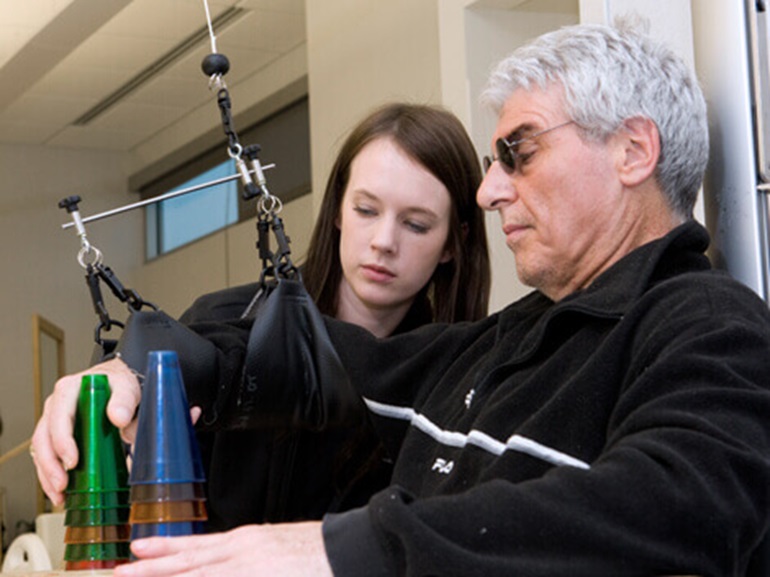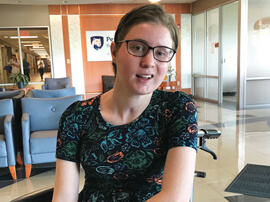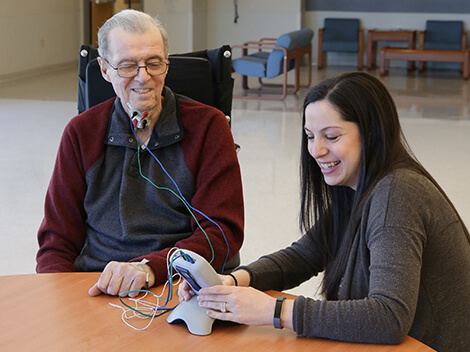Brain Injury Rehabilitation
Individualized care that optimizes recovery

Expert level care
TriHealth Rehabilitation Hospital’s brain injury rehabilitation program focuses on improving your quality of life. Our team works closely with the acute care hospital team to ensure a smooth transition to our rehabilitation hospital and the next phase in your recovery process.
We apply evidence-based best practices to support your recovery. Our approach includes high touch and high tech methods of rehabilitation during your three hours of therapy per day, five days per week.
-
We draw on the knowledge of an experienced team of brain injury specialists to address the range of medical, physical, functional and emotional issues you face.
This interdisciplinary team is led by a physiatrist, a physician board-certified in physical medicine and rehabilitation and includes rehabilitation nurses; physical, occupational and speech therapists; dietitians; case managers; and other clinical and support staff, as needed.
Family members are a part of the care team, too. It’s important for your family to be involved in your therapy sessions, and to learn about your condition and how to support you on the path to recovery.
-
Treatment is carefully integrated and tailored to your specific needs and goals. Depending on how you have been impacted by your injury, we will help:
- Maximize alertness and responsiveness
- Improve sleep/wake cycles
- Develop new cognitive, communication and behavioral strategies
- Improve physical function, balance and mobility
- Manage pain and spasticity
- Improve vision, speech and/or swallowing difficulties
- Enhance the skills needed to perform daily activities
- Overcome psychological and social challenges
- Return home and resume work, school or community activities with as much confidence and independence as possible
-
TriHealth Rehabilitation Hospital works closely with you, your family and the referring hospital to ensure a smooth transition to our program.
Here, you will benefit from a minimum of three hours per day of physical, occupational and/or speech therapies, five days a week. The skills and strategies you learn in therapy will be reinforced by your nursing team.
Treatments include:
- Mobility skill training such as transfers, standing and/or walking
- Strengthening exercises for arms and legs, along with the assistance of robotic equipment
- Tactics to improve communication, swallowing or vision difficulties
- Daily living activities including dressing, feeding and bathing
- Strategies to improve memory, concentration, judgment and problem solving
- Medication management
- Caregiver education and training
At the appropriate time, we’ll coordinate your discharge, help arrange for equipment and provide access to community resources that may be available to you. Our goal, like yours, is for you to move forward with as much independence and confidence as possible.

Technology and research drive recovery

TriHealth Rehabilitation Hospital balances hands-on treatment with the use of cutting-edge technologies to support your individual recovery. We also continue to research, learn and apply the most promising new avenues of care.
Below are some of the advanced technologies available to appropriate patients:
- Robotic, weight-supported training and electrical stimulation devices to improve balance, gait and walking
- Robotic therapies and other technologies to improve function
- Computer-based exercises to improve memory, concentration, decision-making and other cognitive skills
- Bioness Integrated Therapy System (BITS), a large, touch screen digital display with programmed exercises to improve physical, visual, auditory and cognitive abilities of individuals with deficits in these areas
- Fiberoptic endoscopic evaluation of swallowing (FEES), a test used to assess how well you swallow
- Functional electrical stimulation to reduce muscle atrophy
- VitalStim®, a non-invasive external electrical stimulation therapy, applied to the neck, to treat swallowing disorders
- Medication to manage spasticity (stiff muscles)
- Adaptive gaming and other platforms to help individuals participate in recreational and social activities
Brain injury recovery
We will work closely with you, and your family, physician and/or the referring hospital to ensure a smooth transition to TriHealth Rehabilitation Hospital for your rehabilitation.
Did you know?
Studies1 show that people with brain injuries who are treated at a rehabilitation hospital like TriHealth Rehabilitation Hospital have a higher level of independence and are more likely to be discharged home than those treated in other care settings.